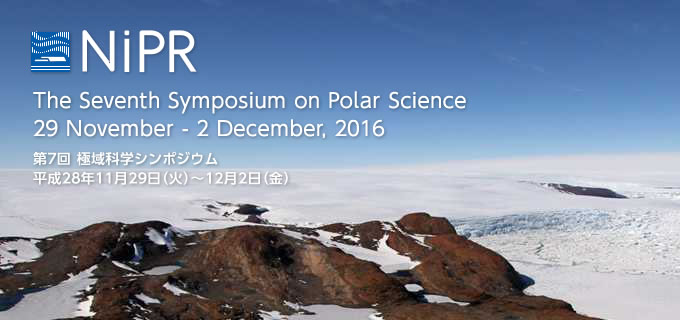



This session will be a forum to discuss the many different aspects of Antarctic and Arctic science and to consider how a large-scale research plan for Polar Science should be formulated. The focus of the discussion will be on preparation of the Master Plan 2020, which will be announced by the Science Council of Japan.
Recently global environmental change has been a subject of great interest to governments and the general public, as well as to earth and planetary scientists. The Arctic and Antarctic regions significantly affect the global environment and provide invaluable information about its variations. In the Arctic region, for example, the temperature increase due to global warming is the largest on the globe. The significant manifestations of climate change have been changes of ecological relationships, human economic activity, and life. In contrast, very little is known about the response of the huge Antarctic ice sheet to global warming, and hence a possible change in Antarctica on a global scale and its prediction are of the greatest interest. Variations in the polar regions are not independent, but instead are connected through oceanic and atmospheric circulation; therefore, the polar regions must be considered as one unified system. Moreover, the Arctic and Antarctic regions are the best locations for observations and investigations related to the space/planetary sciences, the atmospheric/hydrospheric sciences, and the solid earth sciences. The implication is that the polar regions are important windows for the earth and planetary sciences. We expect to discuss how we can proceed with planning a strong proposal for the SCJ's Master Plan 2020.
本セッションでは、様々な観点からの南極・北極両極の科学の議論を通して今後学術の大型研究としてすすめるべきサイエンスを討議する場を提供する。すなわち、日本学術会議が3年ごとに発表している学術の大型研究マスタープランへの極域科学の対応を議論する場としてセッションを企画した。
我々の住む地球環境の変動は地球惑星科学研究者に留まらず広く国民や政府の関心事である。北極および南極は地球環境の変動において大きな影響をおよぼすとともに貴重な情報を有する。たとえば、北極では地球温暖化による平均気温の上昇が最も大きく、気候変動による影響が最も顕著に現れ、生態系や地域住民の生活に影響を及ぼしており、さらには世界全体の経済活動を変化させる可能性がある。一方、南極域では地球温暖化に対する巨大な氷床の応答も未だ不明な点が大きいなど、大規模な地球規模変動の可能性とその予測が大きな関心となっている。また、これらの両極の変化は独立でなく、海洋・大気循環を通じて連鎖していることから、両極をひとつのシステムとして捕らえることが必要となる。これらに留まらず、南極・北極は、様々な宇宙惑星科学、大気水圏科学、固体地球科学の最適な観測・調査フィールドとなっており、まさに地球惑星科学の窓となる重要な研究領域である。
極域科学としてどのようにマスタープランに対応するか、2020年のマスタープランを目指したセッションとしたい。